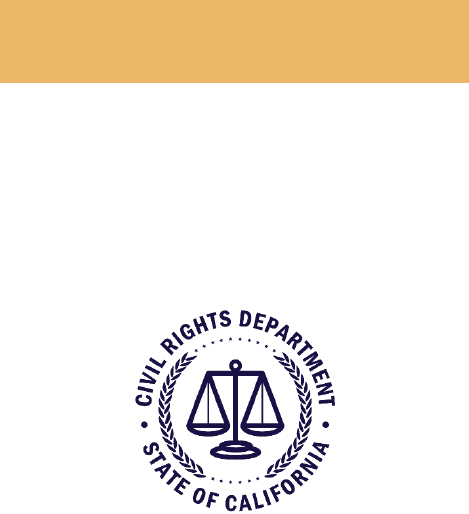
CIVIL RIGHTS DEPARTMENT
DISCRIMINATION,
HARASSMENT, AND
RETALIATION PREVENTION
SAMPLE EEO POLICY
JUNE 2024
SAMPLE EEO POLICY / JUNE 2024 / 2
CONTENTS
Policy: Discrimination, Harassment, and Retaliation Prevention 3 ...................................................
Policy 3 .......................................................................................................................................
Scope of Protection 4 ................................................................................................................
Applicant/Employee Rights 4 .....................................................................................................
Conduct Prohibited by this Policy / Definitions 5 ..............................................................................
Discrimination 5 .........................................................................................................................
Harassment 5 .............................................................................................................................
Sexual Harassment 5 .................................................................................................................
Retaliation 6 ...............................................................................................................................
Sexual Harassment Training Requirements 7 ...................................................................................
Reporting and Addressing Violations of this Policy 7 ........................................................................
Corrective Action Guidelines 9 ..........................................................................................................
Filing Complaints with State and Federal Agencies 9 .......................................................................
California Civil Rights Department 9 ..........................................................................................
U.S. Equal Employment Opportunity Commission 9 .................................................................
State Personnel Board Appeals Division – for State Employees Only 9 .....................................
Discrimination, Harassment, and Retaliation Prevention Policy Complaint Form 10 .......................

SAMPLE EEO POLICY / JUNE 2024 / 3
POLICY: DISCRIMINATION, HARASSMENT, AND RETALIATION PREVENTION
POLICY
Name of Organization is committed to providing a professional work environment
free from discrimination, harassment, and retaliation. Name of Organization is
committed to providing equal employment opportunities to all employees and
applicants for employment. Accordingly, we adopt and maintain this Equal
Employment Opportunity (EEO) policy to encourage professional and respectful
behavior and prevent discriminatory, harassing, or retaliatory conduct in our
workplace. We will implement appropriate corrective action(s), up to and including
discipline, in response to misconduct – including violations of this policy – even if the
violation does not rise to the level of unlawful conduct.
Name of Organization prohibits discrimination and harassment based on the
following characteristics: race, color, caste, religion, religious creed (including
religious dress and grooming practices), national origin, ancestry, citizenship, physical
or mental disability, medical condition (including cancer and genetic conditions),
genetic information, marital status, sex (including pregnancy, childbirth,
breastfeeding, or related medical conditions), gender, gender identity, gender
expression, reproductive health decisionmaking, age (40 years and over), sexual
orientation, veteran or military status, domestic violence victim status, political
affiliation, and any other characteristic protected by state or federal anti-
discrimination law covering employment.
1
Name of Organization recognizes and supports the obligation to reasonably
accommodate employees with disabilities or religious beliefs or practices to allow
those employees to perform the essential functions of their jobs. For more
information, please review Name of Organization’s reasonable accommodation
policy. If an employee believes they need a reasonable accommodation based on
disability or a religious belief or practice, the employee should discuss the matter with
their supervisor or the human resources unit.
Name of Organization prohibits discrimination and harassment based on an
employee requesting or taking any type of leave from work that is protected by law,
such as family and medical leave, pregnancy disability leave, reproductive loss leave,
bereavement leave, time for jury duty, time to appear in court as a witness (including
but not limited to as a victim of crime), time off to obtain relief such as a restraining
order, or another other leave taken or requested pursuant to state or federal law.
2
1
This list of protected characteristics is derived from the Fair Employment and Housing Act (see Cal. Gov. Code §§ 12920 and
12940), its implementing regulations (see Cal. Code Regs., tit. 2, subch. 2), and the Labor Code (see Cal. Lab. Code §§ 230.1 and
1101). It includes a non-exhaustive list of characteristics that are or may be protected characteristics under California law and
model best practices in EEO.
2
Protected leave includes, but is not limited to, those provided for by the Fair Employment and Housing Act (see Cal. Gov. Code
§§ 12945, 12945.2, 12945.6, and 12945.7) and the Labor Code (see Cal. Lab. Code §§ 230 and 230.1).

SAMPLE EEO POLICY / JUNE 2024 / 4
Name of Organization prohibits retaliation against a person who engages in activities
protected under this policy or state or federal law. Reporting, or assisting in reporting,
suspected violations of this policy and cooperating in investigations or proceedings
arising out of a violation of this policy are protected activities under this policy.
All Name of Organization employees are expected to assume responsibility for
maintaining a work environment that is free from discrimination, harassment, and
retaliation. Employees are encouraged to promptly report conduct that they believe
violates this policy so that we have an opportunity to address and resolve any
concerns. Managers and supervisors are required to promptly report conduct they
believe violates this policy. We are committed to responding to alleged violations of
this policy in a timely and fair manner and to taking appropriate action aimed at
ending the prohibited conduct.
SCOPE OF PROTECTION
This policy applies to applicants for employment at, and employees (co-workers,
supervisors, and managers) of, Name of Organization. As used in this policy, the term
“employee” includes contractors and volunteers in our workplace.
This policy applies to all conduct with a connection to an employee’s work, even when
the conduct takes place away from Name of Organization’s premises, such as in a
virtual workspace being used by remote workers, on a business trip, or at a business-
related social function.
APPLICANT/EMPLOYEE RIGHTS
• The right to an application process and/or work environment that is free of
discrimination, harassment, and retaliation
• The right to file a complaint of discrimination, harassment, or retaliation
• The right to report inappropriate conduct, which employees are encouraged to do
immediately and, whenever possible, in writing
• The right to a full, impartial, and prompt investigation by Name of Organization or its
designee into allegations of conduct that would violate this policy
• The right to be timely informed of appropriate information related to the outcome of
an investigation either as a complainant or a respondent in the investigation
• The right to be represented by a person of the complainant’s choosing at each and every
stage of the complaint process
• The right to be free from retaliation or reprisal after filing a complaint or participating in
the complaint process
• The right to file a complaint directly with the California Civil Rights Department, the
federal Equal Employment Opportunity Commission, or other appropriate state or
federal agencies, and to file a civil action in the appropriate court

SAMPLE EEO POLICY / JUNE 2024 / 5
CONDUCT PROHIBITED BY THIS POLICY / DEFINITIONS
DISCRIMINATION
As used in this policy, “discrimination” means the unequal treatment of an employee
or applicant in any aspect of employment and based solely or in part on any protected
characteristic listed above on [insert page number]. Discrimination violates this policy
regardless of whether the applicant or employee actually has the protected
characteristic or is merely perceived to have it. Discrimination also violates this policy
when it’s based on a combination of two or more protected characteristics or the
protected characteristic of someone with whom the applicant or employee is
associated, such as a family member or friend.
Examples of discrimination include, but are not limited to:
• Allowing the applicant’s or employee’s protected characteristic to be a factor in
hiring, promotion, compensation, or other employment related decisions (unless
otherwise permitted by applicable law)
3
• Withholding work-related assistance, cooperation, and/or information to applicants
or employees because of their protected characteristic
HARASSMENT
As used in this policy, “harassment” means disrespectful or unprofessional conduct
that is not welcomed by the person being harassed and is based solely or in part on
any protected characteristic listed above on [insert page number]. Harassment
violates this policy regardless of whether the applicant or employee actually has the
protected characteristic or is merely perceived to have it. Harassment also violates
this policy when it’s based on a combination of two or more protected characteristics
or the protected characteristic of someone with whom the applicant or employee is
associated, such as a family member or friend.
Harassment can be:
• Verbal (such as slurs, jokes, insults, epithets, gestures, or teasing)
• Visual (such as posting or distributing offensive posters, symbols, cartoons, drawings,
computer displays, or emails, staring, or leering)
• Physical (such as physically threatening another person, blocking someone’s way, or
making physical contact in an unwelcome manner)
SEXUAL HARASSMENT
As used in this policy, “sexual harassment” means harassment based on sex (including
pregnancy, childbirth, breastfeeding, or related medical conditions), gender, gender
identity, gender expression, or sexual orientation. It includes all of the actions
described above as harassment, as well as other unwelcome sex-based conduct, such
3
For example, Cal. Gov. Code §§ 18973.1 permits a preference for veterans in state civil service.
SAMPLE EEO POLICY / JUNE 2024 / 6
as unwelcome or unsolicited sexual advances, requests for sexual favors,
conversations regarding sexual activities, or other verbal or physical conduct of a
sexual nature. Sexual harassment does not have to be of a sexual nature and sexual
harassment does not need to be motivated by sexual desire. In addition, sexual
harassment may include situations that began as a consensual dating or sexual
relationship, but that later became a relationship that was not welcomed by one of
the people involved. Sexual harassment is generally categorized into two types:
1. Quid Pro Quo Sexual Harassment (“this for that”) includes but is not limited to:
- Submitting to sexual harassment in order to keep one’s job, get a new job, or
receive an employment benefit or opportunity
- Making decisions about an employee based on their acceptance or rejection of
sexual harassment
2. Hostile Work Environment Sexual Harassment
- Unwelcome conduct on the basis of sex, gender, gender identity, gender
expression, or sexual orientation by any person in the workplace that
unreasonably interferes with an employee’s work performance and/or creates
an intimidating, hostile, or otherwise offensive working environment. When the
conduct is not welcome, severe or pervasive, and based on sex, gender, gender
identity, gender expression, or sexual orientation, examples of sexual
harassment creating a hostile work environment include, but are not limited to:
o Sexual advances, flirtation, teasing, sexually suggestive or obscene letters,
invitations, notes, emails, voicemails, or gifts
o Comments, slurs, jokes, remarks, or epithets
o Leering, obscene, or vulgar gestures
o Displaying or distributing sexually suggestive or derogatory objects, pictures,
graphics, cartoons, videos, images, or posters
o Impeding or blocking movement, touching, or assaulting others
o Reprisals or threats after a negative response to sexual advances
o Conduct or comments consistently targeted at one gender, even if the content is
not sexual
RETALIATION
As used in this policy, “retaliation” means any adverse employment action taken
against an applicant or employee because that person participated in activity
protected under this policy or reasonably thought to be protected under this policy.
Examples of protected activities include, but are not limited to:
• Reporting or assisting someone in reporting suspected violations of this policy
• Cooperating in investigations or proceedings arising out of a violation of this policy
• Filing a complaint with the California Civil Rights Department or the U.S. Equal
Employment Opportunity Commission

SAMPLE EEO POLICY / JUNE 2024 / 7
“Adverse employment action” is conduct or an action that materially affects the
terms and conditions of the applicant’s or employee’s employment status or is
reasonably likely to discourage the person from engaging in a protected activity. Even
actions that do not result in a direct loss of compensation or in termination may be
regarded as an adverse employment action when considered in the totality of the
circumstances.
When done because an applicant or employee reported a violation of this policy, filed
a complaint, or otherwise participated in any activity protected (or reasonably
thought to be protected) under this policy, examples of retaliation under this policy
include, but are not limited to:
• Demotion, not promoting, or not considering for promotion
• Suspension, reduction in pay or hours, or changing work assignments
• Denial of a merit salary increase
• Failure to hire or consider for hire
• Harassment
• Denying employment opportunities or not talking to an employee when otherwise
required by job duties
• Denying a reasonable accommodation
SEXUAL HARASSMENT TRAINING REQUIREMENTS
California law requires that every two years, all employees receive training to increase
their understanding of workplace sexual harassment and provide them with tools to
prevent such harassment.
4
This training must include information about preventing
harassment based on sexual orientation, gender identity, and gender expression, as
well as information about employees’ role in creating an underlying culture of mutual
respect in our workplace. Specific components of the training include how to
promptly and effectively respond to sexual harassment when it occurs, the effects of
abusive conduct in the workplace, and ways to appropriately intervene if one
witnesses behavior that is not aligned with this policy.
REPORTING AND ADDRESSING VIOLATIONS OF THIS POLICY
Any employee or applicant who experiences or witnesses behavior they believe
violates this policy is encouraged to immediately tell the offending individual to stop
and that the behavior is inappropriate, but only if they feel comfortable doing so. The
applicant or employee should also immediately report the alleged violation to their
4
Cal. Gov. Code § 12950.1. Employers may utilize the Civil Rights Department’s online trainings at
www.calcivilrights.ca.gov/shpt/ to satisfy this requirement.

SAMPLE EEO POLICY / JUNE 2024 / 8
supervisor, manager, or the EEO Officer. There is no chain of command when contacting
the EEO Officer: an employee may contact the EEO Officer directly without first seeking
supervisory approval. If the person accused of violating the policy is the employee’s
supervisor or manager, the employee should report the conduct to any other supervisor,
manager, or the EEO Officer. A complaint may be verbal or in writing. Written
complaints may be made using the Name of Organization EEO Complaint Form
(attached to this policy).
Supervisors or managers who learn of any potential violation of this policy are required
to immediately report the matter to the EEO Officer, and must follow that officer’s
instructions of how best to proceed.
Name of Organization will promptly look into the facts and circumstances of any
alleged violation, as appropriate. Even in the absence of a written or verbal complaint,
Name of Organization may initiate an investigation if it has reason to believe that
conduct may have violated this policy. Moreover, even where a complainant conveys a
request to withdraw their initial complaint, Name of Organization may continue the
investigation to ensure the workplace is free from discrimination, harassment, and
retaliation. Name of Organization will also investigate anonymous complaints. The
method will depend on the details provided in the anonymous complaint. If the
complaint is sufficiently detailed, the investigation may be able to proceed in the same
manner as any other complaint. If the information is more general, Name of
Organization may need to do an environmental assessment or survey to try to
determine if misconduct has occurred. All investigations will be fair, impartial, timely,
and completed by qualified personnel.
To the extent possible, Name of Organization will endeavor to keep the reporting of
the applicant or employee’s concerns confidential; however, complete confidentiality
cannot be guaranteed when it interferes with Name of Organization’s ability to fulfill its
obligations under this policy, applicable law, and any court order. All employees are
required to cooperate fully with any investigation. This includes, but is not limited to,
maintaining an appropriate level of discretion regarding the investigation and
disclosing any and all information that may be pertinent to the investigation.
Upon completion of the investigation, if misconduct is substantiated, Name of
Organization will take appropriate corrective and preventive action in order to stop
the conduct – up to and including discipline where warranted – prevent its recurrence
and remedy its effects.
Contact information for Name of Organization’s EEO Officer is:
[Insert name and contact info here]

SAMPLE EEO POLICY / JUNE 2024 / 9
CORRECTIVE ACTION GUIDELINES
Name of Organization will take appropriate corrective action(s) up to and including
discipline against any employee(s) when an investigation has found that misconduct
occurred. Such corrective action(s) may include, but are not limited to, letters of
reprimand, suspension, demotion, or termination. Additionally, depending on the
nature of the violation, civil liability could be imposed on the person responsible for
the misconduct as well as Name of Organization.
FILING COMPLAINTS WITH STATE AND FEDERAL AGENCIES
Employees and applicants may also file complaints of discrimination, harassment, or
retaliation with the agencies listed below. Individuals who wish to pursue filing with
these agencies should contact them directly to obtain further information about their
processes and time limits.
CALIFORNIA CIVIL RIGHTS DEPARTMENT
• Website: www.calcivilrights.ca.gov
• Complaint-filing portal: https://ccrs.calcivilrights.ca.gov/s/
• General information: (800) 884-1684 (voice), (800) 700-2320 (TTY), or California’s Relay
Service at 711
• Email: [email protected]
U.S. EQUAL EMPLOYMENT OPPORTUNITY COMMISSION
• Website: www.eeoc.gov/employees
• General information: (800) 669-4000, (800) 669-6820 (TTY), or (844) 234-5122 (ASL
Video Phone)
• Email: [email protected]
STATE PERSONNEL BOARD APPEALS DIVISION – FOR STATE
EMPLOYEES ONLY
• Website: www.spb.ca.gov
• General information: (916) 653-0799 or (916) 653-1498 (TDD)

NAME OF ORGANIZATION
DISCRIMINATION, HARASSMENT, AND RETALIATION PREVENTION POLICY
COMPLAINT FORM
COMPLAINANT INFORMATION
NAME:
DIVISION / UNIT:
OFFICE LOCATION:
WORK PHONE:
IMMEDIATE SUPERVISOR:
Please describe the conduct that you believe violates the Discrimination, Harassment and
Retaliation Prevention Policy. In your narrati ve, describe: (1) What happened to you; (2) Why
you believe you are experiencing discrimination, harassment, or retaliation, including the
reason or evidence you have to support your belief; and (3) When the acts of discrimination,
harassment, or retaliation occurred. Attach additional pages if needed. If you require assistance
with completing this form as a reasonable accommodation, please contact the EEO officer.
SAMPLE EEO POLICY / JUNE 2024 / 10

PERSON(S) ALLEGED TO HAVE VIOLATED THE POLICY
Person #1 - Name: Classification: Work Location:
Person #2 - Name: Classification: Work Location:
Person #3 - Name: Classification: Work Location:
PERSON(S) WITH INFORMATION/KNOWLEDGE OF THE ALLEGED INCIDENTS
Witness Name: Classification: Work Location:
Witness Name: Classification: Work Location:
Witness Name: Classification: Work Location:
HAVE YOU COMPLAINED TO AN YONE AT
NAME OF ORGANIZATION
ABOUT
THIS MATTER?
If yes, explain the situation. When did you complain, to whom, and what was the result?
(You may attach additional pages if necessary)
Please submit to the Name of Organization EEO Officer:
[Insert name and contact info here]
SAMPLE EEO POLICY / JUNE 2024 / 11
